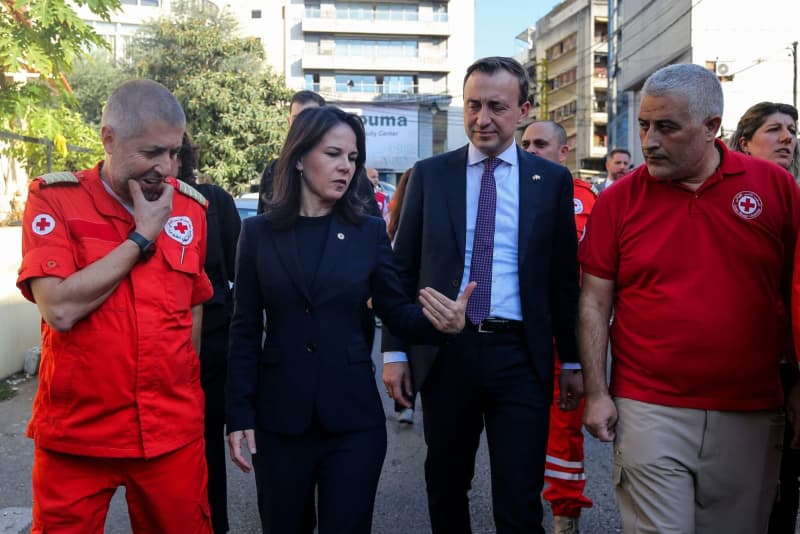Germany is pledging an additional €60 million ($64.7 million) in humanitarian aid to Lebanon, as Foreign Minister Annalena Baerbock warns that the conflict between Israel and Hezbollah could lead to the “complete destabilization” of the country.
German Chancellor Olaf Scholz announced the support late on Wednesday during a phone call with Lebanese caretaker Prime Minister Najib Mikati, according to government spokesman Steffen Hebestreit.
Baerbock visited Beirut on Wednesday, warning of dangerous consequences for the wider Middle East if the conflict between Israel and the Iran-backed Hezbollah militia further escalated.
“A complete destabilization of the country would be fatal for the most religiously diverse society in the Middle East, and also for the entire region,” Baerbock said in the Lebanese capital ahead of talks with Lebanese politicians and aid organizations.
The visit, which was not previously announced due to security reasons, was Baerbock’s first trip to Lebanon since Israel escalated its conflict with Hezbollah in September, launching a ground offensive into southern Lebanon and a wave of airstrikes in Beirut in the most significant fighting in the country since the 2006 war.
Israel’s operation has killed hundreds of Lebanese and caused hundreds of thousands to flee southern Lebanon.
It has intensified in recent days, with major missile strikes on Hezbollah targets in Beirut.
Baerbock said in Beirut that Israel’s campaign has “succeeded in significantly weakening the Hezbollah terrorist organization.”
She was set to travel onwards to Paris to take part in an international aid conference for Lebanon on Thursday, which will focus on providing support for Lebanon’s war-stricken population and rebuilding the country into a stable, functioning state.
Participants include Lebanon’s international partners, the UN, the European Union, and various regional and civil society organizations.
“Now we need to work with our partners in the US, Europe and the Arab world to find a viable diplomatic solution that safeguards the legitimate security interests of Israel and Lebanon,” Baerbock stated.
The minister said the key to peace lies in the UN Security Council Resolution 1701, which calls for Hezbollah to withdraw from southern Lebanon in order to protect residents of northern Israel.
The Lebanese military – which has attempted to remain neutral in the conflict between Israel and Hezbollah – has an important role to play in enforcing the resolution, Baerbock said, ahead of talks with its top commander, Joseph Aoun.
Tight schedule of meetings
Amid repeated Israeli strikes on the Lebanese capital in recent days, Baerbock’s visit followed a tight schedule, with the exact timings and locations of her meetings being communicated to Israel in advance.
She first met the speaker of the Lebanese parliament, Nabih Berri, whose is seen as close to Hezbollah.
At a crisis response centre of the Lebanese Red Cross, she was briefed by humanitarian workers, who said they had recently come under fire despite publicizing their deployment.
In a statement, Baerbock highlighted that the humanitarian situation is becoming increasingly desperate in Lebanon amid the ongoing fighting.
She condemned “how irresponsibly terrorists hide behind civilians and continue to fire rockets at Israel,” while demanding that Israel respect international humanitarian law and protect innocents.
She also insisted that UN peacekeepers must be protected, after a number of attacks on the United Nations Interim Force in Lebanon (UNIFIL) were attributed to Israeli forces in recent weeks.
“Any deliberate attack on UN peacekeepers is a violation of international humanitarian law,” she warned.
Baerbock later held a video call from the German embassy in Beirut with UNIFIL commander Aroldo Sáenz and Richard Kesten, the German admiral heading UNIFIL’s maritime task force.
Baerbock demands aid for northern Gaza, defends arms for Israel
Baerbock also called on the Israeli government to allow more humanitarian aid into northern Gaza, as she defended ongoing arms deliveries to Israel.
The German foreign minister said the situation “especially in northern Gaza is becoming more desperate by the day” amid a fresh Israeli offensive.
Northern Gaza has been cut off for 19 days, Baerbock said, with humanitarian aid “only trickling in.”
Earlier this year, the Israeli government promised to “flood” the Gaza Strip with aid, Baerbock recalled. “This humanitarian aid must arrive in Gaza,” she insisted.
“There is an obligation under international law to provide humanitarian aid,” she added.
She further highlighted the International Court of Justice’s ruling that Israel must provide civilians in Gaza with aid.
“This order is binding on Israel, on its government, under international law,” she emphasized.
However, Baerbock insisted that Germany continues to support Israel “including with weapons” in its right to self-defence.
All arms deliveries are subject to international humanitarian law, she maintained.
“The Israeli government bears responsibility for ensuring that international humanitarian law is observed,” the minister said.





